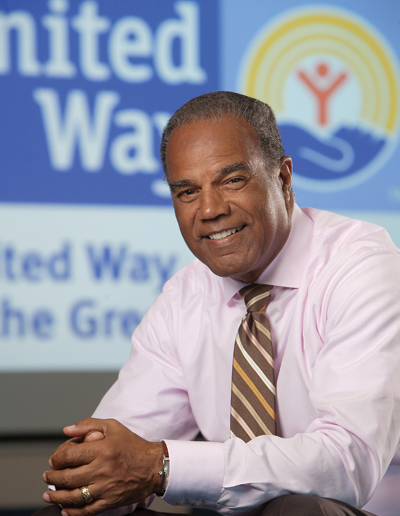It’s a rare family who never needs assistance, says Craig Chancellor. As president and CEO of United Way of the Greater Triangle, he’s spent a lifetime helping to provide it.
“Doing something that really makes a difference in people’s lives is very attractive to me,” said Chancellor. “I’ve been fortunate to be in a position to help other people, and that’s made me happy.”
This year, as United Way celebrates its 125th anniversary, Chancellor is winding down his 37-year career.
A stuffed bear named Walter, in memory of his late mentor Walter Tarpley, holds a prominent seat in Chancellor’s office, a reminder of his 1975 start in Columbus, Ohio.
“It was not till I met Walter that I became familiar with United Way, and he’s responsible for me being a United Way career professional,” Chancellor said. In 1977, Tarpley encouraged him to accept a position at United Way of America, now United Way Worldwide, which placed Chancellor on the path to CEO.
The bear is also a nod to a lighter side of this husband and father of four, who has a ready smile, loves golf, has dabbled in modeling and is a member of Cary Photographic Artists.
Prior to taking the Triangle’s lead United Way role in 2002, Chancellor served the organization in Ohio, Virginia, Wisconsin and Michigan.
“Each United Way is local and autonomous, and they’re different in the sense that you’re dealing with different populations and economies,” he said. “But they’re the same in that the needs are same: People need food, shelter, clothing and help with housing.”
United Way of the Greater Triangle serves Wake, Durham, Orange and Johnston counties. It’s the state’s third largest United Way in funds raised — more than $170 million during Chancellor’s tenure — and assists one in three people regionally.
“Our United Way is going to focus on poverty as a need in the Triangle community,” Chancellor said. “For the average person, it’s difficult to see poverty. Cary doesn’t have the numbers of homeless on the street like we see in other cities, but it’s here.
“The number of people who find themselves in poverty is increasing dramatically. And the face of homelessness has changed, to include entire families. Obviously, this entails a lot in terms of needs, from affordable housing to jobs, to kids being prepared to succeed in school.”
The model to address homelessness has changed, says Chancellor, who co-chaired the steering committee that brought Wake County into collaboration with the U.S. Interagency Council on Homelessness in 2006, followed by Durham and Orange counties.
“Before, it was find them shelter, offer services, then find housing,” he said. “Our plan now is housing first, then support services to help them stay in it. It’s a brand new ball game.”
The effects of homelessness on education are of special concern to Chancellor.
“Anything that touches kids touches me,” he said. “There’s lots of talk in the Triangle about graduation rates and keeping kids in school, but if they’re behind in technology, they’ll drop out.”
He’s led the expansion of the Teaming 4 Technology program, which grew from a fledgling program in 2002 to become the largest United Way program in the U.S., this year placing more than 3,000 computers in area schools, homes and nonprofit agencies.
“We’re fortunate to have companies in the area gracious enough to give us their old computers so we can refurbish them and get them back into the community, and it’s a program we are proud of,” Chancellor said.
He also led this year as United Way of the Greater Triangle opened its funding process to more nonprofits, to better channel resources.
“As we developed a model to focus on poverty, we knew it was important that the money go to agencies providing the strongest programs. To do that, we had to open the system up to service providers that had traditionally not been United Way agencies. This will be very important to our efforts,” Chancellor said.
“There’s never enough money,” he added, to meet fast-increasing needs. “People are on waiting lists for services. As an organization we’ve had to become more focused.”
Retirement at year-end and travel with his wife, Terri, will mark big changes in daily life for Chancellor. But he’s certain of his decision — and convinced his heart will remain in the work.
“It’s been a great journey for me and my family,” he said, “and when you boil it all down, it’s about the satisfaction I get from this kind of work. You can’t spend 37 years of your life doing something without it becoming your life. Our volunteers, and especially the staff I’ve worked with over the years, will be difficult to leave.
“This organization holds a special place in the human services arena. The partnerships we’ve formed with businesses carry on, and United Way will continue to be an integral part of the social fabric of our community. That’s just the kind of work we do.”





